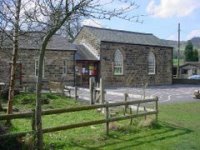DCC Councillor Writes to DCC
This letter has been sent to Derbyshire County Council by Barrie Taylor (Liberal Democrat), the County Councillor for Whaley Bridge and Blackbrook ward, which includes Combs.
21st June 2007
Dear Mrs Hill,
Proposed Closure of Combs Infant School
I am writing in response to your official consultation letter dated 15th May concerning the proposals for the closure of Combs Infants School.The fact that Combs School was judged to be “Outstanding” in last years OFSTED inspection makes it unusual among schools where closures have been proposed. As a result it cannot be argued that closure would benefit present or future pupils in any way. The case for closure must rest on benefits elsewhere, either to other schools or more generally as a result of financial savings.
As spelt out in the report to Cabinet, the programme of school closures is driven by the problem of surplus places. This is not a problem at Combs, nor likely to be in the foreseeable future, despite some projections indicating a slight decline from the immediate catchment area. It is more likely that Combs will be over subscribed.
The problem of falling rolls does affect Chapel Primary School, and the consultation paper makes the reasonable assumption that closing Combs would increase numbers at Chapel, as Combs children are expected to proceed to Chapel School at Junior age.
It came as a surprise therefore to discover that hardly any Combs children in fact go on to Chapel School, and the only logical conclusion is that in the absence of Combs school very few parents would elect to send their children to Chapel School. This pattern goes back at least eight years and must be considered unlikely to change in future years. Closing Combs School would therefore not help to solve the problems of surplus places at Chapel Primary School.
It has also been an established pattern that only a minority of pupils at Combs School live within its official catchment area, and there has been a general assumption that many pupils came from considerable distances. On more detailed analysis this has proved not to be the case. The official catchment area only includes the Combs valley itself which has only a small population. In practice there are half as many people again who live in the adjacent areas of Tunstead Milton and Manchester Road who are nearer to Combs School than to Chapel Primary, and even more living in outlying areas from which Combs is equally accessible. The consultation paper suggested that there would be an environmental benefit resulting from reduced travel distances if Combs School closed. Again this assumption has been shown to be unfounded. Even if there had been an environmental benefit as forecast, it would have been so marginal that it would surely have had no effect on the outcome.
One of the significant factors required to be taken into account when considering closing a school is the effect on the local community. It is generally the case that the closure of any village school does have a profound effect on the function of the local community which is hard to define and impossible to measure. However in the case of Combs there is a unique symbiotic relationship between the Village Hall Trust, the School and the Church which ultimately owns the building.
In practice the community, in the form of the Village Hall Trust, has effectively subsidised the school by freezing the rental payments for many years. As a result the total premises costs to the school have been exceptionally low, to the benefit of the quality of education. This contribution by the community would clearly be lost if the school were to close.
At the same time the rental paid by the school to the Village Hall Trust pays most of the overhead costs of the buildings, and without this income it is very unlikely that the Village Hall Trust would be able to survive for long. The likely outcome is that before too long the building would have to be sold by the church for conversion to a dwelling. The Village Hall is at present the centre of thriving community activities, and without the hall these too would be lost. It is therefore hard to overstate the effect of closure of the school on the Combs community.
The one remaining possible “benefit” from the closure of Combs School is that some money would probably be saved by the Authority. Quantifying this saving is not as simple as comparing the cost per pupil with the average cost across the county, and it is evident that the actual cash saving would be modest. The Authority clearly has a duty to consider all potential savings most carefully. However it is evident that within the established policy of providing some financial support to smaller schools, the cash saving alone would not have been sufficient to propose the closure of the school.
The OFSTED report on Combs School concluded that it provided outstanding value for money. In the absence of the other benefits that were anticipated in the original consultation document there remains no case for closing a school that has been widely acknowledged as a centre of excellence.
Yours sincerely,
Councillor Barrie Taylor

No comments:
Post a Comment